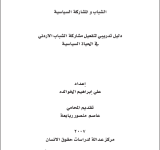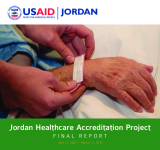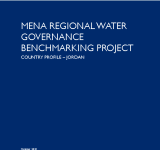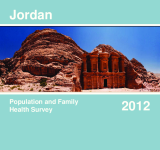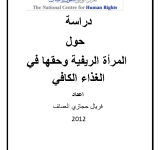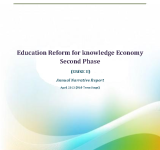planning
The report aims to provide an executive summary and major results and accomplishments;; lessons learned and challenges and opportunities of the Jordan Healthcare Accreditation Project (JHAP). The overall goal of the JHAP was to improve the health status of all Jordanians and quality and safety of healthcare services through accreditation. The project's methodology was assisting the Government of Jordan to adopt a regulatory framework for the health sector;; through the establishment of national and internationally recognized healthcare standards and accreditation. The key results of the project include an organizationally and financially sustainable accrediting agency in Jordan;; the Health Care Accreditation Council (HCAC);; an HCAC board with the appropriate skills to govern the agency and support from the Ministry of Health;; the Royal Medical Services;; the university hospitals;; and the Royal Court for accreditation. The report concludes with recommendations for the HCAC in areas such as financial sustainability;; credibility of the organization;; keeping the momentum and new business development and innovation. Some opportunities that the report suggests include expanding in the Middle East and North Africa region;; partnering with well-known quality organizations;; offering courses online and benchmarking subscriptions.
The report is a Jordan country profile of the Regional Water Governance Benchmarking Project (ReWaB) and the results assessment of the project. The ReWaB is a project that aims to establish a system of water governance capacity and performance benchmarking for Middle East and North Africa countries. The report resents the projects' approach to water governance benchmarking;; brief overview of the political;; economic;; and social situation in Jordan;; the country's water availability;; and it also outlines the main users and managers of Jordan's limited water resources and identifies relevant trans boundary issues. With a description of the main actors in Jordan's water governance and their influence on functional performance;; the report presents and discusses the main findings of the Policy and Legal Analysis and the expert-based assessment;; which gauged the functional effectiveness of the Jordanian water sector and application of good governance processes in water-related decision-making. The report concludes by highlighting Jordan's organizing and building capacity and strategic planning in policy documents. It also notes areas with potential challenges such as the broad function of allocating water and mechanisms for water trades and complimentary conflict mitigation.
يلخص هذا التقرير نتائج مسح السكان والصحة الأسرية في الأردن عام 2012 الذي أجرته دائرة الاحصاءات العامة. ولقد نفذ المسح ضمن برنامج المسوح الديموغرافية والصحية الذي تم تصميمه من أجل جمع البيانات عن الانجاب وتنظيم والأسرة وصحة الأمهات والأطفال. ولقد قدمت مؤسسة ICF الدولية المساعدة الفنية لهذا المشروع من خلال برنامج المسوح الديموغرافية والصحية.
يكمن اﻟهدف اﻟﻌﺎم ﻣﻦ هذه الدراسة إلى توضيح واقع المرأة الريفية الأردنية وحقها في الغذاء ;; من خلال مدى موائمة التشريعات الوطنية في كفالة هذا الحق وموقفها من المواثيق الدولية الناظمة ;; ومدى كفالة حقوق المرأة الريفية في التعليم والعمل والصحة والضمان الاجتماعي والحماية الاجتماعية وواقع التمثيل للمرأة بشكل عام في التنظيمات السياسية والاجتماعية والجمعيات التقليدية الرسمية وغير التقليدية;; اضافة إلى تشخيص الأسباب التي تحول دون إعمال هذا الحق ودور الحكومة في التصدي لظاهرة الفقر والجوع التي تعاني منها النساء الريفيات من خلال الاستراتيجيات و البرامج والمشاريع والخطط الوطنية الهادفة الى تأمين الغذاء الكافي للمواطنيين كافة. اعتمدت الدراسة على اسلوب منهج المسح الاجتماعي باستخدام استبانة لجمع بيانات الدراسة وكانت العينة عشوائية (166) إمرأة ريفية من المناطق الريفية ومناطق جيوب الفقر في المملكة وكما تم تحليل بيانات الدراسة باستخدام برنامج التحليل الاحصائي SPSS. وقدمت الدراسة مجموعة من التوصيات التي تستدعي ضرورة العمل على زيادة الوعي لدى المراة الريفية وتطوير قدراتها وتمكينها اقتصادياً.
The second phase of the Program Education Reform for the Knowledge Economy Program (ERfKE II) continues to build on the achievements of the first phase and follow the same implementation arrangements that have proven to be successful in (ERfKE I);; and in the same time;; focuses on schools as the locus of change as well as on the need to enhance capacity building at the central and field levels. The development objective of (ERfKE II) is to provide students enrolled in pre-tertiary education institutions in Jordan with increased levels of skills to participate in knowledge economy. Also the Mid-Term review highlighted the concrete progress achieved by (ERfKE II) in several key areas related to policy development;; quality of education interventions and school construction;; and identified the key issues as a summary of the overall progress that will be tackled and addressed during the remaining stage of implementation.
